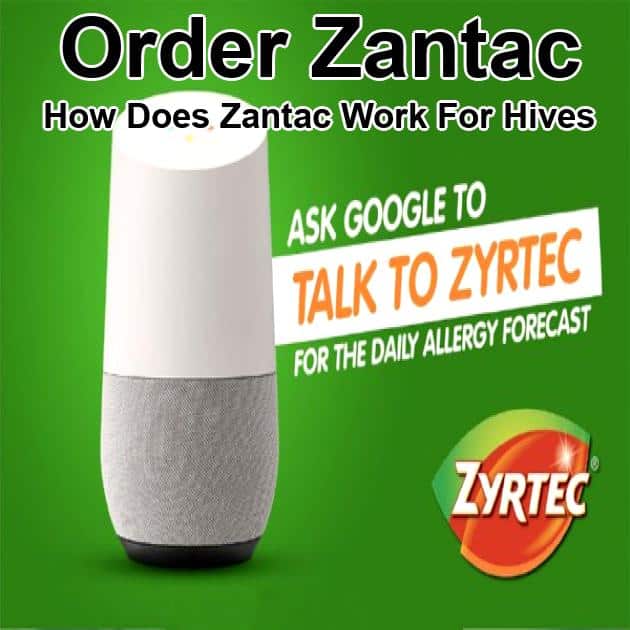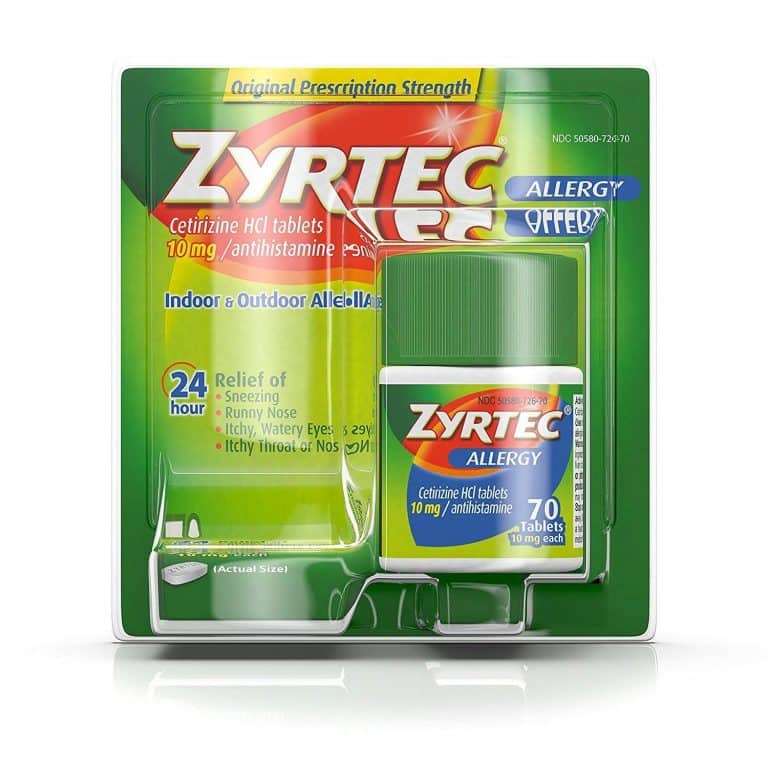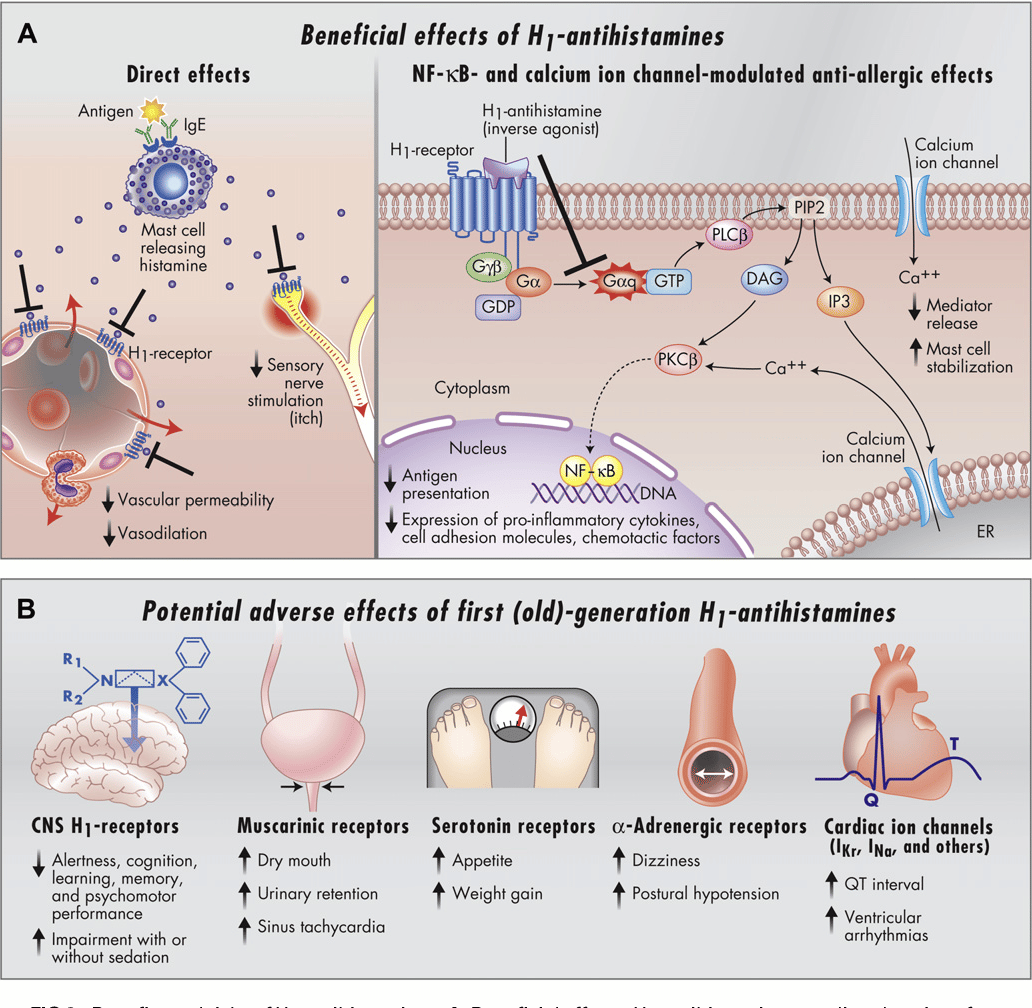Q: Are There Some People Who Should Not Use Antihistamines
A: While most people can safely take antihistamines for their allergy or cold symptoms, some should not use them. These include people with epilepsy , those with high blood pressure, people with kidney or liver disease, pregnant women, diabetics, and those with asthma. Also, children should never be given first-generation antihistamines.
Treatment Of Underlying Diseases
Chronic urticaria may be a manifestation of an underlying disease, and in these cases, treatment of the underlying condition may be warranted. The best example of a systemic condition that is commonly associated with chronic urticaria is autoimmune thyroid disease, that is, Hashimoto’s thyroiditis. Treatment with thyroxine has been reported to alleviate the urticaria. A few reports have suggested that Helicobacter pylori might be associated with chronic urticaria in some patients, and eradication of H. pylori is associated with remission of chronic urticaria. According to one report, five patients with chronic urticaria went into complete remission with oral acyclovir therapy. Use of nasal filters in treating chronic urticaria has occasionally been found beneficial. A few case reports have described resolution of recalcitrant chronic urticaria after treatment of dental abscesses.
How Is Ciu Treated
Your doctor may try a combination of different medicines to try to relieve CIU. They may first prescribe an allergy medicine called an antihistamine.1 If that doesnt work, there are other medicines your doctor may try until they find the ones that work for you.
Treatment may lessen your symptoms but not relieve them completely. Since CIU can be frustrating, support may help you cope as well. Support groups, such as the Asthma and Allergy Foundation of Americas Skin Conditions Support forum, can connect you with others with CIU. Talking to others who understand what youre going through can be comforting.
Medical Review September 2017.
Read Also: How Long Does Hiv Last
What Helps Hives Besides Antihistamines
Hives generally go away in a few hours, but some people may live with chronic hives or regular episodes. Here are a few proven home remedies that can help soothe your itchy skin:
- Use a cold compress:Apply an ice pack or washcloth soaked in cold water to your skin for 10 minutes to provide rapid relief from pain and itchiness. You may repeat it several times throughout the day until symptoms subside.
- Use anti-itch cream: Calamine lotion, menthol, capsaicin or hydrocortisone creams are the most effective in quickly relieving skin discomfort. Other topical anesthetics such as lidocaine cream can provide relief against long term itching or pain.
- Take a cool bath: Heat can make itching worse while cool water can soothe the skin.
- Avoid triggers: If you are repeatedly experiencing episodes of hives, keep a symptom diary to help you identify foods, allergens , chemicals, activities or medications that might be provoking allergic reactions. Avoid any triggers that you discover in your diary.
Lastly, to learn more about itchy skin and hives, read Curist team member Waverlyâs story about her experiences diagnosing chronic hives and treating itchy skin.
What Is The Difference Between Hives Vs Skin Rash

Hives are a particular type of skin rash. They are raised, itchy red bumps that can be large or small in size. Skin rash, on the other hand, can take many other forms often characterized by changes in color or texture of the skin. They can cause your skin to feel rough and look scaly or cracked. Unlike hives, rashes donât always itch. Sometimes, they hurt or make your skin feel irritated, scratchy or uncomfortable.
You May Like: Does Magic Johnson Have Hiv
Q: Can I Take Antihistamines Every Day Indefinitely
A: Antihistamines are not like a daily multivitamin supplement. They are not supposed to be part of your everyday routine. They are intended to be used only when the situation calls for it. This way, you minimize the risk of interactions with other medications, minimize your experience of side effects and reduce the chance that you could build a tolerance to them 90033-0/abstract” rel=”nofollow”> 15), which can be an issue if they are overused.
Appendix 2 Medline Search Strategy
1. randomized controlled trial.pt.16. 11 or 12 or 13 or 14 or 1517. 10 and 1618. exp Histamine H2 Antagonists/ or H2 receptor antagonists.mp.19. exp Histamine H1 Antagonists/ or H1 antihistamine antagonists.mp.20. H1 receptor antagonists.mp.21. exp Steroids/ or Steroids.mp.22. tricyclic antidepressants.mp. or exp Antidepressive Agents, Tricyclic/23. 18 or 19 or 20 or 21 or 2224. 17 and 23
You May Like: How To Identify Hiv Rash
Be Open To Other Natural Remedies
According to hives.org, other products youll likely find around the house or at your local holistic retailer may help soothe the itch and inflammation. These include topical applications of:
-
Aloe vera lotion, which is loaded with vitamin E, can soothe skin, and can help stop itching.
-
Anti-astringents such as witch hazel, which may help shrink blood vessels near your welts.
-
Vinegar and water, applied directly to hives with a cotton ball, may help the itch go away.
-
Baking soda and water, made into a paste, can be slathered onto hives to help relieve itching.
What Are The Symptoms Of Hives
Hives can appear anywhere on your body and can vary in appearance depending on the person and the situation, but the main sign of hives is the hallmark red raised welts. The welts from hives can:
- have a pale center
- appear in clusters
- change shape and location in a matter of hours
- be tiny or as big as a dinner plate
- itch, sting, or cause a burning sensation
- swelling around eyes, lips, feet or throat
It is important to note that rarely, a person with hives and angioedema can also get anaphylactic shock which include signs of trouble breathing, a drop in blood pressure, or a loss of consciousness. If this situation ever occurs, make sure to seek medical attention immediately.
Read Also: Can You Get Hiv From Your Own Blood
Oz Histafen Antihistamine Itch Calming Cream
Features
- NOW IN OUR DOUBLE SIZE 8OZ JAR! Suffer from Histamine Intolerance or Mast Cell Activation Syndrome )? If so this cream can calm it! Certain foods are histamine releasing or high in histamine content which makes the skin itch.
- Creams on the market do not address the issue of histamine issues. The only thing recommended is an antihistamine cream but medications can often block the production of DAO or diamine oxidase enzyme .
- Our Histafen moisturizing cream cools and softens the skin WITHOUT ingredients that promote additional histamine to be released from mast cells. Especially when you sleep: Nocturnal Pruritus or itching at night may be due to histamine release after having dinner – which releases after you sleep.
- This moisturizing cream does not cause histamine block but calms the skin itch and does not have histamine or releasing ingredients. In addition to that it helps with dry skin. Works great as a hives relief cream and intensive healing lotion eczema cream.
- Combines blue tansy essential oils along with roman chamomile essential oil, peppermint essential oil, clove oil essential oil, fennel oil, rosemary essential oil and thyme essential oil along with aloe vera, organic shea butter, Vitamin E, olive oil, almond oil and coconut oil.
What Creams Or Lotions Should I Use To Manage The Constant Itch From Ciu
The itch from CIU is due to an internal histamine release. Topical agents including topical antihistamines are mostly ineffective at managing symptoms.
Take frequent lukewarm showers and apply soothing and cooling lotions when hives erupt and are most itchy. A topical steroid may also be helpful. However, oral antihistamines and omalizumab or other immune-system modifiers will provide far more relief.
Read Also: Which Of The Following Can Result In An Hiv Infection
Q: Can I Have A Few Beers While Taking Antihistamines
A: One of the primary side effects of first-generation antihistamines is drowsiness. That also happens to be one of the primary side effects of alcohol consumption. As such, the two should never be used together . That extra level of drowsiness presents a very real danger to life and limb by increasing the odds of an accident. It does not have to be an auto accident. It could be falling down stairs or drowning in a swimming pool.
Q: Why Do I Have Allergies And Others Do Not

A: The fact is, no one is quite sure why some people develop allergies, and others do not. There are plenty of theories out there, but precious little agreement. Genetics is a popular theory . But in truth, just blaming mom and dad is a bit of cop out, because it does not address why they had allergies. The bottom line is: we know how allergies happen, and we know we can control them with antihistamines. But we do not really know why they happen.
Read Also: Can Blood Test Detect Hiv
Why It Is Important To Do This Review
Urticaria, especially the chronic type, presents a significant burden of disease for many people. It can be associated with major direct and indirect healthcare costs, resulting in consequent socioeconomic implications . The degree of prevalence of urticaria and its effect on the quality of life makes urticaria an important disease from both an individual and a societal perspective. H2RAs appear to offer an additional way of treating people with urticaria. Uncertainties regarding longterm safety, coupled with a range of treatments of possibly questionable effectiveness, suggest that a systematic review is needed. In addition, this review might also help to clarify which groups of people and/or which types and subtypes of urticaria might benefit from the use of H2RAs.
Do Antihistamines Treat Hives Do Antihistamines Make Hives Go Away
For acute cases of hives , well-known over-the-counter antihistamines such as Benadryl , Claritin , Xyzal , Zyrtec , and Allegra can help reduce swelling, redness, itching, and other problems such as wheezing or difficulty breathing. Chronic hives are usually treated with a three to six month regimen of antihistamines. For chronic hives, itâs recommended to use a newer antihistamine like levocetirizine which does not have the same sedating side effects like Benadryl.
If none of the antihistamines work, consult your doctor or pharmacist as they may also add a different type of antihistamine called an histamine-2-receptor blocker, such as ranitidine or cimetidine. These medications are usually used to treat acid reflux but can also help with reducing hives.
Also Check: What Are The Early Signs Of Hiv
What Tips Do You Have For Identifying Triggers
There are several known triggers that can aggravate your hives. Heat, alcohol, pressure, friction, and emotional stress are well-reported to worsen symptoms.
Additionally, you should consider avoiding aspirin and other nonsteroidal anti-inflammatory drugs . They can aggravate CIU in many cases. You may continue to take low-dose, baby aspirin when used to prevent blood clots.
Q: Do Antihistamines Have Any Side Effects
A: They do. But those side effects tend to differ significantly in character and intensity depending on whether an antihistamine is first, second or third generation. First-gen antihistamines may cause drowsiness, mental confusion, water retention, moodiness, and blurred vision. While second and third-gen antihistamine side effects tend to be limited in character and short-lived.
You May Like: Can You Get Hiv From Razor Blade
How The Intervention Might Work
There is still a degree of uncertainty as to the precise mode of action of H2RAs. Histamine is a potent mediator of immediate hypersensitivity reactions. Fifteen per cent of the histamine receptors in the skin are H2receptors, and it is acknowledged that human skin mast cells, which store histamine also express H2receptors . The H2RAs are reversible structural analogs of histamine that cause a decrease in the tonic activation rate of the receptor. Thus, these agents act as inverse agonists with a functional antagonism of histamine activity, hence, reducing the histamine activity on the receptor sites. In this way they may be able to block histamine release and curtail, or even prevent, symptoms of urticaria from occurring. It has also been suggested that one of these H2RAs, cimetidine, has an immunomodulator function and may have a role to play in chronic autoimmune urticaria.
What Is The Best Antihistamine For Hives
There is not a single best antihistamine for hives, it depends on which antihistamine works for you. Commonly, people often try Benadryl for hives and while it is effective, it has a significant tradeoff – Benadryl is very sedating. So Benadryl may be effective for acute hives, Benadryl is not appropriate for chronic hives. Instead, a newer antihistamine with less sedating side effects like levocetirizine, would be better antihistamine for treating hives.
Also Check: How Many People In Miami Have Hiv
Avoidance Of Aggravating Factors
Most treatment plans for urticaria involve being aware of one’s own triggers, but this can be difficult or impossible. Obviously, the preferred form of treatment is avoidance of the causative agent in the exceptional case where it can be identified and avoidance is feasible. In addition to avoidance of the possible causative factor, patients with chronic urticaria should be appropriately advised to avoid, to the extent feasible, common potentiating factors, such as, alcohol overuse, excessive tiredness, emotional stress, overheated surroundings, aspirin, and other nonsteroidal anti-inflammatory drugs .
Avoidance of aspirin and other NSAIDs should usually be recommended, because these drugs aggravate chronic urticaria in 30% of the patients. Regular low-dose aspirin, for its antithrombotic properties, can be continued. Angiotensin converting enzyme inhibitors should be avoided in chronic urticaria because angioedema and, rarely, urticaria are recognized adverse effects.
Avoidance of dietary pseudoallergens including food additives , natural salicylates , and unidentified aromatic substances in tomatoes, herbs, and white wine have not been found beneficial in treating chronic urticaria. A strict low pseudoallergen diet for 3 weeks initially may be helpful for some patients with mild chronic urticaria, but there is a general agreement that dietary measures have no role in most forms of chronic urticaria unless proved by a double blind placebo-controlled challenge.
What Are Hives How Long Do Allergic Hives Last

Hives are a common skin reaction to an allergen . About 20% of people will develop hives at least once in their lifetime. Though uncomfortable, It is a harmless skin condition marked by spots on the skin that are itchy, red, and raised. Hives are usually a temporary condition, and there are two different types of hives, acute hives and chronic hives .
- Acute Hives : Short term, most likely allergy-related rash that fades in 2-3 hours but could hold on for as long as six weeks.
- Chronic Hives : Long term, auto-immune related rash that lasts longer than six weeks.
Read Also: Hearing Aids At Costco Price
Types Of Histamine Blockers
Histamine is a substance released by the body’s immune system from cells called mast cells. This occurs in response to injury or allergies. Histamine receptors are the proteins on cells found in the brain, blood vessels, lungs, skin and stomach that bind to histamine in order to produce an inflammatory response. The symptoms of the inflammatory response are red and watery eyes, swelling of the body, itching, rash or wheal and flare of the skin, stomach upset, congestion and runny nose, along with sneezing, coughing, and shortness of breath.
Histamine blockers, or antihistamines, are medications that prevent the binding of histamine to its receptors within the body, and thereby inhibit or lessen these symptoms. Three types of histamine receptors are affected by these drugs called H1-, H2-, and H3–receptors. While H1-receptors are more widespread in the body, H2-receptors are found largely in the stomach and H3-receptors are in the brain. H1-blockers prevent or reduce severe allergic reactions, allergy-induced runny nose called allergic rhinitis, sinus congestion, and rash. H2-blockers decrease heartburn-related conditions like acid reflux called gastroesophageal reflux disease or GERD, where acid or food regurgitates back from the stomach into the throat, and peptic ulcers, which are sores in the stomach’s lining resulting from excessive secretion of stomach acid. H3-blockers are still being studied in conditions involving the brain and sleep. .
Maximum Doses And Effectiveness Of Antihistamines
All 178 included patients were initially treated with the licensed, once daily, dosage of antihistamines . Of them, 27 patients used antihistamines only on demand. In 138 patients the licensed dose was ineffective and in all these refractory patients the dose was raised up to fourfold. This remained ineffective in 97 . Subsequently, 59 of these 97 patients were treated with higher doses of antihistamines by combining two types of second generation antihistamines with a maximum of eightfold the licensed dose. The median maximal combined dose of antihistamines in these 59 was eightfold , however in 8 individuals the dose was raised further . Ten of 59 patients subsequently became completely free of symptoms, and nineteen patients had sufficient results. Thus, in 49% of patients a higher than fourfold dose reduced or completely eliminated symptoms. The remaining 38 of the 97 refractory patients received no further treatment , or further treatment was unknown , or they received other types of therapy including ultraviolet treatment , for which effectiveness results were not included in the current study .
Fig. 2
Antihistamine dosages and results. The following dosages were considered as standard dose: levocetirizine 5 mg, desloratadine 5 mg, fexofenadine 180 mg, clemastine 1 mg, hydroxyzine 25 mg, cetirizine 10 mg, loratadine 10 mg, acrivastine 8 mg three times daily
Also Check: How Does Hiv Cause Disease
Q: Will Using Antihistamines Prolong A Cold
A: This is a good question. Logic would seem to dictate that if you block the beneficial activity of histamines that you would just be prolonging the time it takes to recover from a cold or flu. But there is virtually no agreement on whether that is actually true. Some argue that even if it is true, four days spent feeling not-so-bad is better than three days spent feeling awful. So the debate rages on.